 BBC News
BBC NewsBorrowing was £17.4bn last month, the second highest October figure since monthly records began in 1993.
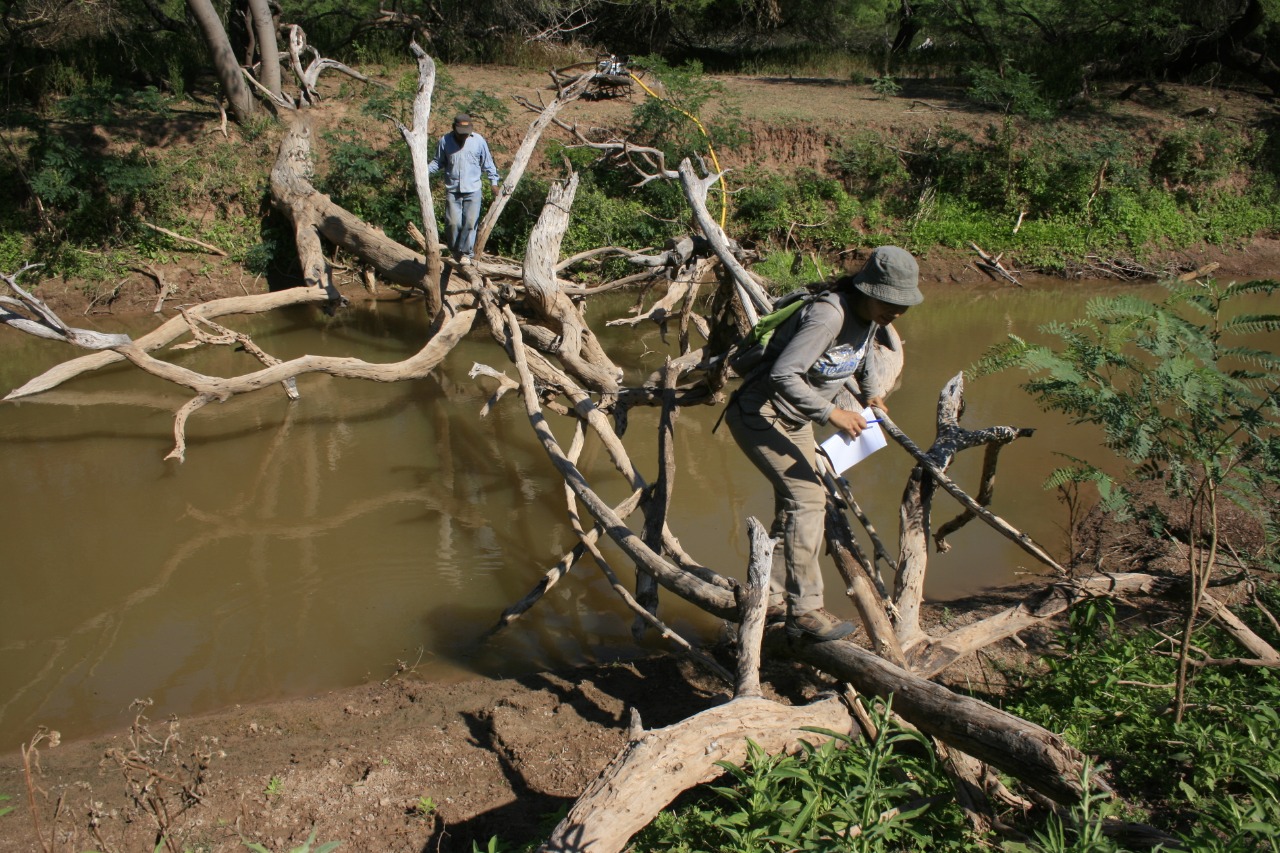
Johanna Mitchell
Lumos Education was delighted to be invited to sponsor Women Powering Smart Energy’s conversation event at the Argentine Ambassador’s Residence. The evening, co-ordinated by Steve Gladman of Women Powering Smart Energy, highlighted the relationship between gender and conservation.
The Dalai Lama has said that the western woman will save the world. The women changemakers who spoke at the Ambassador’s Residence in September embody his prediction. Their dynamism and steadfast commitment to preserving the environment and wildlife makes them a true beacon of hope in the sphere of conservation.
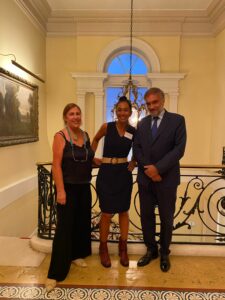
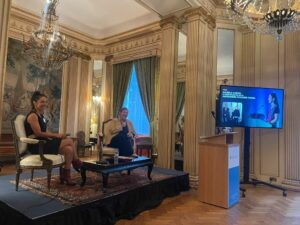
Only a Child
The Ambassador for Argentina in the UK, his Excellency Javier Esteban Figueroa, launched the evening. I introduced the film, Only a Child, which was produced by Simone Giampaolo and narrated by the then 12 year old girl, Severn Cullis-Suzuki in 1992. The message, from this young child’s perspective, is that governments and communities need to act now to affect lasting change. Her compelling young voice states eloquently that ‘northern countries will not share with the needy, even when we have more than enough, we are afraid to share, we are afraid to let go of some of our wealth.’ Severn declares: ‘you grown- ups say you love us, but, I challenge you, make your actions reflect your words.’ At the end of the film, Severn, now a Canada- based environmental activist, is pictured, over 30 years after her words, as an adult with her own children. The time that has elapsed between Severn’s childhood and her growing into adulthood and raising her own family, demonstrates powerfully how much-needed changes to halt the environmental breakdown have been slow to manifest.
Dr Micaela Camino
The audience enjoyed the rich conversation between award-winning conservationist, Dr Mica Camino and the Cultural Attaché to the Argentine Embassy in London, Minister Alessandra Viaggiero. Their discussion focused on the importance of engaging with indigenous communities, who live close to nature and depend on the local food, structure and wildlife for their own survival. And for the continued survival of their children. Mica spoke about the importance of understanding that, in conservation, the environment and people can’t be separated. The two are inextricably linked.
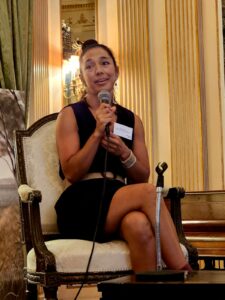
Dr Micaela Camino
Mica is a committed conservationist on a mission to empower communities, defend their human rights and to preserve the fragile ecosystem of Argentina’s Dry Chaco. Nestled in Northern Argentina, this expansive forest teams with both indigenous communities and critically endangered species, notably the Chacoan peccary. However, the relentless advance of agricultural development threatens not only the habitat but also the very livelihoods and cultural heritage of the local people. Mica is the recipient of the Whitley Fund for Nature (Green Oscar) 2022 for her research work to defend the Dry Chaco forest. As a Researcher of the National Scientific and Technical Research Council of Argentina at the Conservation Biology Laboratory of Centre for Applied Ecology of the Coast and Founder and Director of Proyecto Quimilero, Mica juggles her career with mothering her young son. Her tireless efforts exemplify the power of grassroots action and the potential for positive change even in the face of daunting challenges.
Mary Rice
Following Mica’s incredible achievements, the audience listened to Mary Rice’s equally impressive contribution to the environment. In conversation with Aisling Ryan, herself a committed conservationist, Mary described her role in bringing about the global ivory ban. She spoke about her negotiations with governments and key players to enforce action or legislative change, often in extremely demanding political and social circumstances. Mary and Aisling reminisced about their attendance at Kenya’s historic ivory burn in Nairobi. Both thinking that they would stay in an hotel but, in reality, Mary camping knee-deep in mud wearing a pair of child’s pink wellies, whilst grappling with streaming the ivory burn live to the international community.
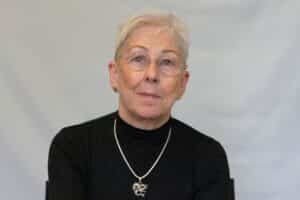
Mary Rice
As Executive Director of the Environmental Investigation Agency (EIA), Mary Rice’s accomplishments are simply colossal. In addition to directing the EIA’s work on the illegal ivory trade and attending major international meetings related to the subject, Mary acts as a spokesperson and presents on the issue. Working with investigative and analytical teams to obtain the data and evidence required to support and facilitate enforcement action or legislative change, she liaises closely with stakeholders worldwide to ensure an innovative and strategic approach to what is a dynamic and global problem.
Trained as a journalist, Mary spent 15 years working in Asia before moving to London. She is also a published author and photographer. “Heat, Dust and Dreams”(Struik), an exploration of people and environment in Namibia’s Kaokoland and Damaraland, was the result of three years of research and photography in what is now known as the Kunene region, home to the last viable population of black rhino outside a protected area. And one of the world’s last great wildernesses.
Aisling Ryan
Leading Conservationist, Climate and Sustainability Leader, Aisling, led the campaign to stop the ivory trade alongside Mary Rice. This campaign resulted in four UN resolutions and bans in China, Hong Kong, the UK, US, Canada and France She has collaborated with the Kenyan government, EIA, WildAid, ZSL and other key NGOs. She also negotiated a pro-bono partnership with WPP to create a mass lobby campaign and with Kantar to deliver pivotal research to prove public support to ban the ivory trade. She has worked with Conservation South Luangwa (CSL) in Zambia since 2014 and continues to serve as Non-Executive Director and Trustee.
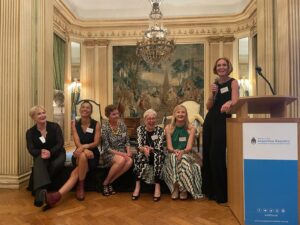
Recognised for her contribution to sustainability and ESG, Aisling is a recipient of many awards, including the UN SDG Impact Award, Gold Cannes Lions, D&AD Pencils, the Grand Prix at The Marketing Society Effectiveness and the Campaign Big Awards. She was also acknowledged for her valued contribution to DE&I on the 2019 and 2021 HERoes INvolve Women Role Model Awards Global 100 List of Senior Executives. Aisling pioneered the People’s Seat for the United Nations. She also drove negotiation and partnership between Sir David Attenborough, UNHQ, UNFCCC and Poland and wrote his speech for COP24.
Millie Kerr
Following Aisling’s discussion with Mary, Millie Kerr, US lawyer turned conservationist, author and wildlife photographer, spoke with Aisling Ryan about her distinguished career, marked by a resolute dedication to the cause of environmental preservation.
In conversation with Aisling, Millie explained how her grandparents’ ranch had been a key influence in her childhood and served to cultivate an early love of wildlife and devotion to conservation. Weekends and holidays were spent with the animals on their property, which included scimitar-horned oryx, rheas, zebras and other foreign species which they began introducing in the 1970s.
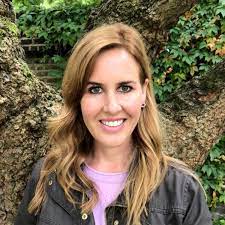
Millie Kerr
After working for a prominent London international law firm, her career trajectory took an unexpected turn during a sabbatical to Namibia, where she undertook a role at a wildlife conservancy. This experience kindled her passion for documenting and advocating for wildlife and nature conservation. On returning to the United States, a brief stint at the Federal Communications Commission preceded her relocation to New York City, where she continued to write while employed by the Wildlife Conservation Society/Bronx Zoo.
Asked by Aisling how she would advise Londoners looking to make a difference, she suggested a rewilding a small garden, emphasising that even with the shortages of outdoor space in London, this is perfectly possible and incredibly rewarding.
Based in London, Millie is a freelance multimedia journalist. Her writing on travel and wildlife conservation has been featured National Geographic Traveller, The New York Times, and The Wall Street Journal. Millie’s debut nonfiction book, “Wilder: How Rewilding is Transforming Conservation and Changing the World,” published by Bloomsbury in August 2022, enjoys acclaim and endorsement from celebrated conservationist Jane Goodall. This volume, characterised as a fusion of popular science and memoir, surveys rewilding projects worldwide, highlighting the individuals defining the evolution of conservation.
Professor Genoveva Esteban
Distinguished academic, Professor Genoveva Esteban (Bournemouth University, UK), specialises in microorganisms in fresh water and marine environments. Having completed her PhD in Spain, Genoveva came to the UK as a postdoctoral student and has worked here even since. She has juggled her research and conservation work, with her family commitments. During her career, Genoveva has pioneered ground-breaking research into the diversity of free-living microorganisms to help us to better understand ecosystems. She explains how, as some microorganisms eat bacteria, they benefit the environment. And as foundations of the food chain, microorganisms help to conserve the environment, essentially safeguarding bigger animals by protecting the little ones.
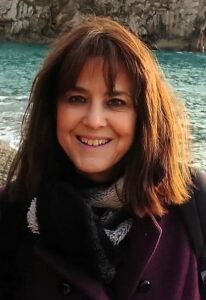
Dr Genoveva Esteban
Genoveva agrees that there is a gender imbalance in the way that men seem to be seen as more credible, in the world of conservation, but she says things are starting to change. She is currently looking to develop a project, with fellow academics in the UK and on mainland Europe, to see how the different freshwater environments and habitats can be connected. This project is about habitat connectivity in a fragmented world.
Genoveva has infused the younger generation with her passion and knowledge. Her students around the globe, including in Poland the US and Spain, are continuing Genoveva’s work in their own labs. She says that, in her experience, the younger generation want to use science to help conserve the environment because they know that the planet is under threat. They are interested in understanding how science works and how to use the scientific knowledge they have gleaned encourage conservation. As well as working with students at her university, Genoveva also works with children in her local community to promote STEM subjects. She runs science family days at her local museum to promote science and the importance of cherishing the environment.
As well as encouraging and inspiring the next generation, Genoveva’s has built and nurtured deep and lasting partnerships with colleagues from Government departments, research centres and wildlife trusts. She sends 15 students every year on a work experience placement to work with researchers in those institutions.
The depth and richness of the contribution that these women have made to the environment and conservation is simply extraordinary. In a world that, with the pace of environmental damage, and inability of governments to take urgent action, often seems hopeless, these women offered hope. I know I, and all of my Lumos Education colleagues and partners who attended, poured out into the London evening feeling inspired, humbled and hopeful.
Ronel Lehmann, of Finito Education, recently told me that a many of his young university leavers are keen to follow careers in the fields of conservation and the environment.
Micaela Camino, Mary Rice, Millie Kerr, Aisling Ryan and Genoveva Estaban are blazing a trail for young women- and men- to follow.
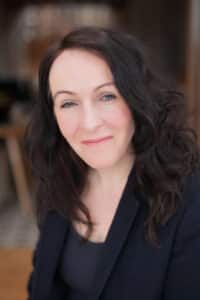
Johanna Mitchell is the Founder and Director at Lumos Education